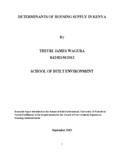| dc.description.abstract | Housing as an economic good is often considered as an investment good with expected returns
either in terms of rent or capital gains made from sale of the investment. The problem of
provision of adequate shelter is a complex one due to the heterogeneous nature of housing as a
good and the fact that housing is a social right. For this reason, the focus of the government
should be facilitating private sector in terms of housing finance, production and construction as
well as provision of infrastructure. This study analyzed the factors influencing the housing
supply of housing. The research is biased towards the urban areas due to the significant shortages
being experienced in urban areas, of housing. The study utilized regression analysis to analyze
the relationship between stock of houses and the price of houses, income per capita, inflation and
interest rate.
The study found out that the price of housing is the most positive significant factor in
determining the number of houses delivered in a period. As prices become favorable for the
producers, the number increases. However, this has to be met by equal demand for the houses
constructed. The research has indicated that increased per capita income does not result into an
increase in houses and therefore the ability to build may limit the willingness to do so. To the
contrary, there was an inverse relationship between stock of houses supplied and the income per
capita. The other determinants; inflation and interest rate were found to have positive
relationship although they were statistically insignificant | en_US |

